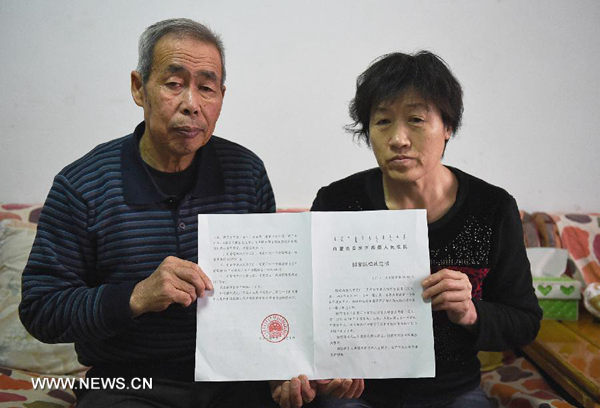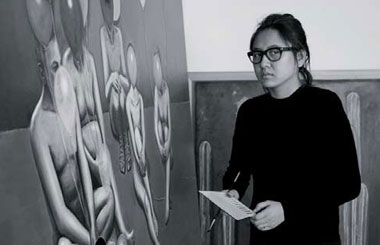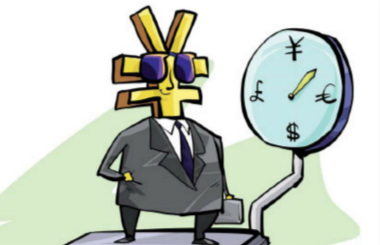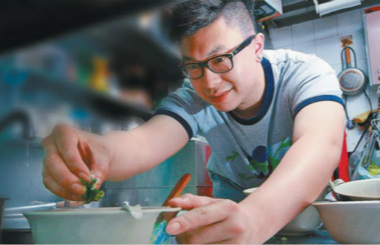Late justice a lesson for judicial practice
Updated: 2016-02-02 08:39
(China Daily)
|
|||||||||||
 |
|
Li Sanren (L) and Shang Aiyun, parents of Huugjilt, who was wrongly executed for rape and murder at age 18, show the verdict of state compensation totaling more than 2 million yuan (about $322,000) in Hohhot, capital of north China's Inner Mongolia Autonomous Region, on Dec 31, 2014. On Dec 15, 2014, the Inner Mongolia Autonomous Regional Higher People's Court overturned Huugjilt's previous conviction and ruled he was not guilty of rape and murder, saying that the facts of his case were unclear and evidence was inadequate. [Photo/Xinhua] |
We have mixed feelings about the acquittal of Chen Man, who was sentenced to death with a two-year reprieve in 1994 on the charge of arson and murder.
We feel both happy and sorry for him, as he could have been released 23 years ago had the police in Haikou, South China's Hainan province, followed the right legal procedure, as there was no sound evidence to incriminate him.
He could also have been acquitted in 1994 had Haikou Intermediate People's Court done a good job of examining the evidence provided by prosecutors.
Compared with Hugjiltu, a Mongolian youth, who was executed for rape and murder in Inner Mongolia autonomous region in 1996, but found innocent 20 years later, Chen was lucky, as the local intermediate court sentenced him to death with a reprieve of two years and ignored the calls by the local procuratorate for him to be executed.
He was even more fortunate that the Supreme People's Court ordered a retrial of his case by Zhejiang High People's Court, which organized a collegiate bench that did a good job collecting evidence to support his alibi. Except for his own confessions which he said were extorted through torture, the bench found there was no sound evidence to support the charge against him.
All 27 judicial workers, including police officers, prosecutors and judges, involved in the case of Hugjiltu have been given disciplinary punishments. So possibly will those involved in this case.
The overturning of both wrong verdicts, along with other similar ones, has shown the will of the top judicial authorities to readdress any injustice that has occurred. Yet the failure to follow the principle of assumption of innocence and punishment of crimes according to the law also highlights the fact that arduous efforts are needed to improve the judicial system.
What is behind the fact that it has taken more than 20 years for a wrongly convicted person to have his injustice rectified? Clearly there is still a long way to go for Chinese judicial workers to develop the awareness that it is not a shame or stain on their records but the right thing for them to do to rectify any mistakes they may have made.
Related Stories
Presidents of high people’s courts meet in Beijing to discuss judicial plans 2016-01-28 12:28
Supervision over online judicial auction strengthened 2016-01-28 11:10
China will push forward judicial reform, says public security chief 2016-01-22 10:53
Meng Jianzhu holds think tank forum on judicial reform 2016-01-20 10:16
Today's Top News
China manufacturing activity contracts for 6th month
Sanders plays down Clinton's hold over voters in Iowa
New China-led bank 'will be inclusive'
Horizons expand for Chinese companies in France
Negotiating political transition in Syria 'possible'
Man arrested with handguns at Disneyland Paris
Record number of Chinese tourists visited UK in 2015
Foreigners fill in Spring Festival courier gap
Hot Topics
Lunar probe , China growth forecasts, Emission rules get tougher, China seen through 'colored lens', International board,
Editor's Picks

|

|

|

|

|

|






